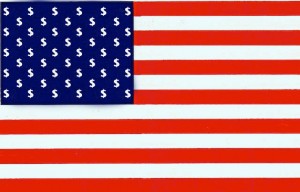
Dear America,
Is it just me, or are more and more of our top students basing their major upon making money?
And when I say, “is it just me”, I mean that literally. Even before I went to college I knew I wanted to be a business major. Why? Because I liked psychology.
I know, I know, there’s a major for that. I decided against it very early on because, without dedicating the better part of a decade to additional education, a psychology major has no guarantee of making any money. Some might say that’s a smart decision. Others might consider it greedy. They’re both right.
I’m from Illinois. I went to the University of Wisconsin Madison. Without any sort of scholarship aid, the yearly out of state tuition rate is now up to an insulting $34,240 per year. My parents had the choice of sending me to my top school of choice, or buying a nice brand new car…every year…for four consecutive years (or four and half, but who’s counting). Saying that I’m “fortunate” to have parents that both are capable and willing to sponsor this sort of investment is the understatement of the century. The more common story goes that you either 1) attend college in-state, 2) take out student loans that won’t get paid off until you have kids of your own or 3) all of the above. I’d say most fall into the last category.
The escalating cost of college is not where I’m going with this.
It was two years ago when I first established a real interest in the stock market. Anything that combines research, intuition, business, and gambling is a recipe for occupying my time. I joined a student investment organization, kept up with a set financial blogs and message boards, and when I felt like decompressing in front of the TV, my station of choice was CNBC. And then…..Earth’s economy bit the dust (and we lead the charge). Why? Primarily because of people like me, or at least the path I was headed down.
If you spend any decent amount of time researching the NYSE, you’ll realize, that over time it’s extremely difficult to outperform the overall market’s average return. This is due to regulations that demand companies disclose all relevant information publicly. In other words, it’s hard to out perform the market, because the market knows what you know. However, greed always finds a way to surface. Since the stock market was becoming too mainstream, Wall Street invented new markets which allowed them to make bets on top of other bets, called derivatives. Since a market’s profit is based on an inefficient spread of knowledge, and no one (including the investors themselves) understood how these investments worked, these new bets were the fastest, easiest way to get rich. Well we all know how the rest of the story goes. Yatty, yatty, yatta, 10% unemployment, stock market drops 60%, people lose their retirement funds, banks crash, government doles out billions to several companies, blah, blah, blah.
The majority of this collapse was the result Wall Street’s undying desire for greed. I had the rare opportunity of being surrounded by some of our university’s best students who were destined down a similar path. Many of our smartest brains, which should have been dedicated to curing cancer, inventing sustainable energy systems, teaching calculus to the less fortunate, etc., were all waiting in line to feed an industry which had just manufactured the greatest economic demise since the Great Depression. That’s depressing. In other words, after watching Star Wars, our viewers couldn’t wait to try out for the part of Darth Vader.
But when you really look at it, who can blame them.
A lot of these kids are either paying their own way through school with loans they don’t expect to pay off for several years, or their parents are working second jobs during the night shift, to help them fulfill their American dream of striking it rich. To say that college students feel pressure to earn a respectable living is like saying a super model pays attention to what she eats. Duhhh.
So then, it seems there are three legitimate (positive) scenarios for our future:
Scenario 1:
Our state and federal government gives out more scholarships, lowers the cost of tuition, and students are more free to pursue a pure passion. Whether that be chemistry, calculus, creative writing, or computer science, the decision shall not be based solely upon the ability to pay off the man.
Scenario 2:
A free market trends toward rewarding more intrinsically valuable services – those who further health, renewable energy, education, etc. I have less faith in this scenario.
Scenario 3:
Students exercise their true dharma (not the & Gregg variety), and let finances be a peripheral rather than primary factor in their decision. Many believe the new zeitgeist calls for conscious awakening. This would entail having the greater good be our true motivating factor. Perhaps our students’ future majors will reflect this.
Still in the near future, those on Wall Street will more than likely be provided the easiest avenue toward wealth. However, over the longer term, as other nations are producing goods and services of real value, a more practical application of intelligence will prove to be the most lucrative.
Sincerely,
A Recent Business Major
